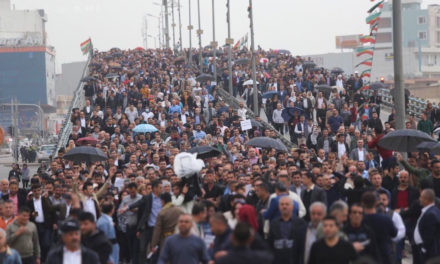The Water Stress Index predicts that Iraq will be without rivers by 2040, as a result of climate change and poor management of water. In addition, the policies of upstream countries have a role in increasing water stress in the Mesopotamian Basin, causing environmental and economic problems. According to this indicator, food security is under severe threat, in addition to internal and external migration, poor water quality, and the subsequent threats to health that water stress causes. Iraq must view this issue as a national security threat and one that is already having a negative impact. The Iraqi government needs to act before Iraq becomes an inhospitable place to live, a far cry from the fertile crescent it once was.
The water problem in Iraq
Since the 1970s the water problem started to worsen in Iraq due to internal and external issues. The flow of water from the Tigris and Euphrates rivers was and continues to be a problem facing the modern Iraqi state since its founding. In the past, it was seasonal flooding, especially from the Tigris river, that caused economic damage to agricultural crops and financial losses to the residents of the riverbanks. The main reason for this problem was that there were no dams controlling the water flow or reservoirs along the two rivers inside Iraq. But the problem changed from facing floods to a crisis of scarcity, as the upstream countries, especially Turkey, began constructing dams which affected the flow of water and reduced Iraq’s water share. Iraq continued to manage water through traditional means which meant inefficiencies and losses as other countries continued to develop their water resources. There was a qualitative breakthrough in Iraq’s water management, at least in terms of dams and reservoirs, where the number of dams reached 14 by 2020, which is a small number compared to the number of dams in neighbouring countries. However, no real progress has been made in terms of the methods of using water for agriculture, industry, or human consumption, which is one of the biggest problems facing Iraqi society today.
Iraq today has an estimated population of 43 million people and the demand for water will continue to increase, as the provision is set to decrease. As for the issue of irrigation of agricultural land, Iraq is still employing traditional methods that lead to wasting water. This has also led to the reduction of arable land, which threatens food security for the citizen and diminishing job opportunities for many workers in the agricultural sector. This raises the unemployment rate, which is already high and has consequential effects on food prices and the economy in general. In the industrial field, water stress affects the production of electricity, as Iraq relies heavily on power stations that need water for cooling purposes. The issue of internal water management remains one of the most difficult challenges facing the Iraqi state.
As for the external dimensions of the problem, Iraq is considered a downstream country as most of the sources of fresh water come from outside Iraqi borders (Turkey, Iran, and Syria), and Iraq loses what is called water sovereignty. Therefore, Iraq is at the mercy of the policies of neighbouring countries that are the source of Mesopotamian water, and this is a threat for Iraqi national security. The global challenge of climate change, which has led to a decline in rainfall amounts throughout the world is also acutely felt in Iraq which is one of the countries that suffers a lot from climate change and desertification. In 2021 Iraq witnessed the second largest drought in the past 40 years and predictions are for more to come. Turkey and Iran are continuing to build dams and changing the course of rivers. The number of Turkish dams on the Tigris and Euphrates has reached 22 dams. These dams have a storage capacity estimated at 100 billion cubic meters, which is three times the storage capacity of Iraqi and Syrian dams combined. Iran has already changed the course of many tributaries that feed the Tigris river along with small dams that control seasonal flows but have led to significant reduction of flows in the southern marshes of Iraq.
The extent of damage caused by water stress
Iraq’s rentier economic system depends on oil. There are attempts to diversify the sources of national income such as relying on agriculture, but this looks increasingly unlikely due to the low water levels of the Tigris and Euphrates rivers. The arable land that Iraq lost due to drought is estimated at 100 square kilometers annually. Iraq has one of the largest bodies of water in the region with the marshes in southern Iraq, but drought has led to loss of livelihood and migration of farm workers, fishermen and buffalo breeders. By the end of 2023, over 135,000 people have migrated from rural areas into the cities in central and southern Iraq. Mass migration presents risks for the security and stability of society. On the one hand, competition for economic resources and job opportunities will intensify, and on the other hand, it will be a gateway to an increase in organized crime and drug abuse. This causes more disturbances in security and safety in the host areas and leads to a cycle of instability. Other societal problems also become apparent such as deprivation of education due to child labour, lack of access to health care, and stress on local infrastructure and resources.
Solutions to Iraq’s water crisis require decisiveness, highly competent management, and a society that has real awareness. Iraq can compensate for the amounts of water it loses due to the policy of upstream countries by agreeing with Syria to provide desalinated water from the Mediterranean and pumping it into the Tigris and Euphrates rivers. This is crucial in preserving groundwater and keeping flows high towards urban centres such as Basra. Lessons can be learned from countries such as Libya and Saudi Arabia who created a network of tubular rivers to provide their cities with water suitable for drinking and agriculture. The Iraqi government also needs to install water meters in every home and business, collect tariffs from citizens and companies, and motivate society to reduce waste and preserve water as much as possible. There also needs to be more support for farmers to use modern irrigation methods in order to reduce water loss. International organizations have also offered many other solutions that Iraq can adopt but it requires more urgency in implementation. Iraq cannot rely on Turkey and Iran to act more fairly and should expect that they will exploit their advantage in water control. Instead, the Iraqi government needs to consider water stress as the most important national security threat now and in the future and act accordingly.
This essay is part of a special series – Empowering Change in Iraq: Policy Recommendations for a New Era











